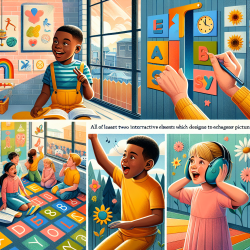Introduction
Emergent literacy skills are crucial for the academic success of all children, including those who are deaf and hard of hearing (DHH). Recent research by Werfel, Reynolds, and Fitton (2023) sheds light on the developmental trajectories of these skills in preschool children who are DHH. This blog explores the findings of their study and offers practical insights for practitioners to enhance their skills and improve educational outcomes for children who are DHH.
Understanding the Study
The study, titled "A Longitudinal Investigation of Code-Related Emergent Literacy Skills in Children Who Are Deaf and Hard of Hearing Across the Preschool Years," examined 30 children who are DHH and 31 children with typical hearing. It focused on five key emergent literacy skills: phonological awareness, phonological memory, phonological recoding, alphabet knowledge, and conceptual print knowledge. The researchers assessed these skills at six-month intervals from ages four to six, utilizing growth curve analysis to compare developmental trajectories between the two groups.
Key Findings
- Children who are DHH scored consistently lower than their peers with typical hearing in phonological awareness, phonological memory, and conceptual print knowledge.
- No significant differences were observed in phonological recoding or alphabet knowledge between the groups.
- The study emphasizes the need for targeted interventions to address deficits in phonological awareness, phonological memory, and conceptual print knowledge.
Implications for Practitioners
Practitioners can leverage these findings to enhance their educational strategies and interventions. Here are some actionable steps:
- Focus on Phonological Awareness: Develop activities that enhance phonological awareness, such as rhyming games, sound matching, and syllable segmentation. These activities can help bridge the gap in phonological skills for children who are DHH.
- Enhance Phonological Memory: Incorporate memory-enhancing activities like digit span tasks and nonword repetition exercises into the curriculum. These can improve phonological memory, a critical component of emergent literacy.
- Improve Conceptual Print Knowledge: Use shared book-reading activities to teach print concepts. Encourage children to identify words, spaces, and punctuation marks in texts to build their understanding of how print works.
- Leverage Technology: Utilize online therapy services and digital tools to provide personalized and engaging literacy interventions for children who are DHH.
Encouraging Further Research
While this study provides valuable insights, it also highlights the need for further research in optimizing emergent literacy interventions for children who are DHH. Practitioners are encouraged to engage in ongoing professional development and research activities to stay informed about the latest advancements in this field.
Conclusion
Enhancing emergent literacy skills in children who are DHH is vital for their academic success. By implementing targeted interventions and staying informed about current research, practitioners can make a significant impact on the literacy outcomes of these children. To read the original research paper, please follow this link: A Longitudinal Investigation of Code-Related Emergent Literacy Skills in Children Who Are Deaf and Hard of Hearing Across the Preschool Years.










